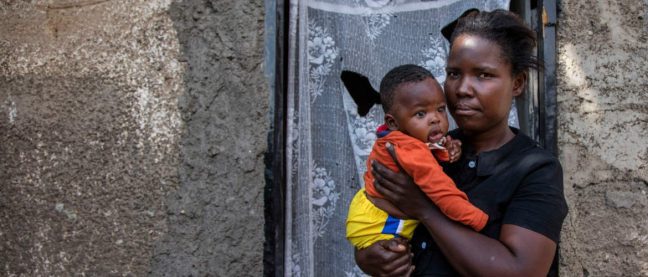Melinda and her family live in a town called John Laing in Lusaka, Zambia. She was nearly nine months pregnant when she went to a local clinic, thinking she was in labour.
Once they ran some tests on her, however, Melinda was told something no pregnant woman would ever want to hear: she was sick with cholera.
Pregnancy is often an anxious time for most expectant mothers, but it’s hard to imagine the terror Melinda must have felt upon learning she also had a deadly disease to contend with.
“I was really scared because it was the first time. At school we used to learn about cholera, so to hear that I had cholera, even the family did not believe I would survive having an advanced pregnancy and cholera at the same time,” Melinda recalls.
Melinda and her family were very worried for the unborn baby.
“I was praying and even the family was crying when they came to visit me as it was the first time for most people to see cholera plus pregnancy.
“It was terrible, I am telling you. Some were saying that maybe she is going to die with the pregnancy or the baby won’t survive, but the people there kept looking after me in a way that I can’t even explain,” she explains.
Fortunately, Melinda made a full recovery from her cholera ordeal, and gave birth to a healthy baby boy. She named him “Gift”.
Melinda isn’t sure how she got cholera, but like many of her neighbours, she doesn’t have access to clean, running water in her house. Instead, she must queue for hours at a local water tank to collect enough water to get through the day.
After washing, drinking and cooking, even a twenty-litre container of water doesn’t go far among her young family.
And when the water tanks run dry, Melinda has no choice but to scoop water from shallow wells close to her house, which — because many homes do not have a toilet — are likely to be contaminated with human waste and household garbage.
And now, while many in Australia are looking forward to the annual festive season, families in Zambia like Melinda’s are bracing themselves for a very different event.
From November to April is known as “cholera season”. It coincides with the wet season when heavy rains wash waste and rubbish into waterways, further polluting the shallow wells many families must rely on for water, and creating a breeding ground for deadly waterborne disease like cholera.
As cholera season approaches, the risk grows daily that Melinda or one of her loved ones might get sick and die from a preventable waterborne disease.
Melinda knows exactly what she and her community needs to survive, “…The most important change we want is that of having access to water and garbage collection services,” says Melinda.
In nearby Chawama, Lazarus can attest to the difference sanitation services make. With support from Oxfam, he has built a thriving rubbish collection business that has had a transformational impact on his town. Thanks to Lazarus implementing the training and hygiene education he received from Oxfam into his business practice, his community has gone from being a cholera epicentre, to being cholera-free.
Lazarus proudly confirms, “So that is the difference that we had because before these programs came in, Chawama used to have cholera every year.”
But until Melinda’s community can access clean water and garbage collection services, they will be extremely vulnerable to deadly waterborne disease this cholera season.
The deadly threat of cholera looms large for families in Zambia who do not have access to safe, clean water. With your urgent gift today we can act fast to provide communities like Melinda’s with the clean water and sanitation services they urgently need. Thank you for your support.
Photos: Georgina Goodwin/OxfamAUS
Donate today to help save lives from cholera
Your gift can help provide access to clean water and sanitation for families in Zambia before cholera season hits.

